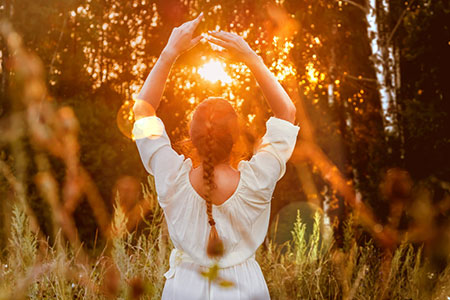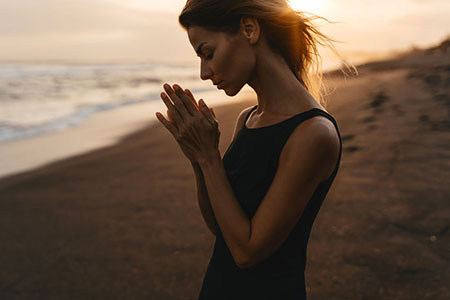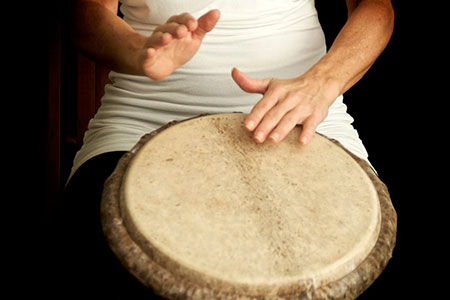individuality
Keeping The Family Out Of Your Love Life
 Family and our relatives have a huge impact on our romantic lives, whether we realize it or not. We bring so much from the way we were raised into our love relationships and marriages.
Family and our relatives have a huge impact on our romantic lives, whether we realize it or not. We bring so much from the way we were raised into our love relationships and marriages.
But having had a difficult childhood does not necessarily set us up for challenges and failure in our relationships. In fact, for those who are self-aware it can be an advantage of choosing not to bring the toxic drama of your childhood home into a current relationship.
For example, if you saw your father treat your mother without respect, you might set your mind to never allowing that happen in your own relationship. This kind of courage and personal responsibility can break the cycle.
We all have things that happen in childhood things that happen that are out of our control, it is all in how you deal with them that forms us as adults. We have a choice always.
The other aspect is culture and the values and customs with which we were raised. Depending on the circumstances it can have a significant impact on our relationships. Once again it is a choice how we want to handle it. Do we follow the family traditions, or not?
It takes courage and an open mind to march to your own drum. Standing up for what you believe can also go a long way. Sometimes this is vital to ensure a healthy, happy relationship that will last.
Of course, the biggest challenge for most couples is having the family up in your relationship business. Do your relatives influence your decisions and interfere in your relationship? Navigating a relationship or marriage successfully in this day and age is challenging enough.
Let Your Authentic Self Shine
 Most people at some point change something about ourselves in the hope of being better liked or accepted by others. Whether it’s a group of friends, a potential romantic partner, or the manager at work, there is constant pressure to conform and fit in. But in the long run, does this help? The truth is: it really doesn’t.
Most people at some point change something about ourselves in the hope of being better liked or accepted by others. Whether it’s a group of friends, a potential romantic partner, or the manager at work, there is constant pressure to conform and fit in. But in the long run, does this help? The truth is: it really doesn’t.
The notion of simply being your authentic self is challenging in an era where everyone seems to be seeking approval and attention. Therefore, the authentic self or the true version of our soul is something one hardly sees in the digital era of social media, influencers, likes, and followers.
However, we may think that a person we see online is someone others won’t like. Maybe our internal critic sees that person as ‘too much’ of something or ‘not enough’ of another. But we are often mistaken, as someone being true to themselves and keeping it real is what most people are spontaneously drawn to.
You might feel like you’re the only strange person at work, or the black sheep of your family, but you’re not the only one. There are thousands of ‘odd’ people out there right now with the same doubts as you!
The old saying ‘there’s a lid for every pot’ is always good to keep in mind. Your authentic self is just what someone else has been looking for. If you feel you don’t fit in with the crowd, take a step back and ask yourself whether you truly want to be part of it anyway? Knowing your true value and finding the things most important to you, will help determine who you want to surround yourself with.
It’s also important to set healthy boundaries. If you feel peer pressured into joining a group, or liking something simply to fit in, ask yourself if this is true to your core. Does it resonate with your authentic self?
Transitioning With Grace
 Autumn always awakens my awareness of transitions. Not only does the entire scenery change color, but each individual leaf on every tree is in a constant shift of shades of greens, golds, yellows, oranges, and reds. With every shifting shade and combination of them, the pattern of the palette continuously alters too.
Autumn always awakens my awareness of transitions. Not only does the entire scenery change color, but each individual leaf on every tree is in a constant shift of shades of greens, golds, yellows, oranges, and reds. With every shifting shade and combination of them, the pattern of the palette continuously alters too.
Then, of course, there is the falling of the leaves – the gradual transition from tree to ground, from full foliage to bareness in various new measures day by day. The rise and set of the sun, and the length of the night and light incrementally inch through their own thresholds as well.
Like the changing season, life is full of transitions. From the moment the soul enters the womb, an endless sequence of them begins. The body develops in a rapid succession of changes, then carries the soul from womb to world.
In the world, the embodied soul then undergoes transition through various ages and stages, growing from infant to toddler to child to adolescent to adult, until gradually winding down to leave the body behind and proceed to the next one or world.
In between, you and I – the embodied souls – may face a multitude of additional transitions in relationships, careers, residences, levels of consciousness, and more. Such transitions – even the best of them – are not easy. They naturally incorporate intervals of instability in the liminal spaces between here and there. Transitions entail shedding, releasing, letting go of the old that was, and then birthing and rebirthing the next and new phase that will be. They empty us out and fill us up, again and again. Transitions are not easy; they may even make us feel queasy!
So, how can we move through the endless array of life’s transitions gracefully? As with all things, there are probably as many ways as there is individuality among people. What I share are simply some of the ones I have found especially helpful.
Honor Yourself With Unconditional Love
 Dear loves, the message we bring to you today is about unconditional love. We want to help you know and understand more about this earthly concept of love, this love that you so desire and, indeed, richly deserve.
Dear loves, the message we bring to you today is about unconditional love. We want to help you know and understand more about this earthly concept of love, this love that you so desire and, indeed, richly deserve.
The first thing you need to know and accept about love is that love in action means freedom; freedom for you to be yourself, and freedom for the other person to be themselves. This is what true love really means. You must be able to allow that other soul to flourish, to fly, to be all that they can be.
Doing anything less than that is not love, it is entrapment. It is expectation. It is setting you up to be hurt and disappointed. We know that you are not used to this concept but some things are true, whether or not you believe them to be so.
Can anyone else be you? Can you be anybody else? The answer to both these questions is no. You were born into your body, which is your earthly vessel. Each body comes in different shapes and sizes, just as each soul inside that body has different needs and wants and dreams.
True unconditional love only comes once you accept yourself for who you are, in all your glory and your entire splendor. Another cannot honor you, if you are not honoring yourself. It may be what you have been taught throughout the years, but We are older than time itself and We tell you the way to achieve love is by setting yourself free to the Universe and the glories of that world.
Your Light, your own individual grace and purpose, can then start to glow, and the one whom is meant to enjoy that, the one whom speaks your language can then find you. For you have only just begun to live.
The Spiritual Power Of Joy
 I have decided that this year I would consciously invite more joy into my daily life. Joy is the feeling of happiness, pleasure or fulfillment that comes from having success, finding good fortune, or achieving a sense of well-being. The wonderful thing about joy is that it can be found in both large and small doses.
I have decided that this year I would consciously invite more joy into my daily life. Joy is the feeling of happiness, pleasure or fulfillment that comes from having success, finding good fortune, or achieving a sense of well-being. The wonderful thing about joy is that it can be found in both large and small doses.
Joy is an enormously powerful spiritual force. Spontaneous laughter can shift a mood in an instant, and tears of joy come at moments that move us to our core. Joy is a state of mind that focuses on the present, despite our circumstances.
Joy brings renewed energy, a feeling of lightness to our body and mind. Suddenly there is enough energy to get things done that need to be done. Joy invites action, instead of procrastination, and encourages gratitude over envy, and peace over anger.
Joy lingers after the laughter and invites us to a state of mind that is peaceful, full of grace, ready to extend compassion, and find forgiveness. In a state of joy spontaneity comes easily, inspiration and intuitiveness peak, and our creativity flows.
Children are masters of demonstrating joy. They are comfortable living in the moment and not filtering out any opportunity to celebrate. They carry no baggage, or expectations. They are wonderful teachers of this powerful spiritual tool.
Anchor your soul purpose and choose conscious ways you can invite and practice joy in your daily life. Even a small dose will do, and it may lead you to seek out other experiences that resonate with your spirit and add to your experience of joy. Notice what makes you smile. Pay attention to the person, the activity or the situation that uplifts your spirit. Stop and savor the feeling.
Simplicity and joy go hand in hand, so don’t overlook the little things. Practice smiling! Smiling releases endorphins which create that sensation of relaxation and happiness.
To The Beat Of My Own Drum
 I am in the process of moving home. While going through years of stored stuff in the attic of my old home, I found a Christmas gift that my parents gave me around the age of four. It was a little drum, intact, with sticks to play to the beat of my young heart. I am sure there were many times my parents thoroughly regretted buying a four-year-old a drum to bang on!
I am in the process of moving home. While going through years of stored stuff in the attic of my old home, I found a Christmas gift that my parents gave me around the age of four. It was a little drum, intact, with sticks to play to the beat of my young heart. I am sure there were many times my parents thoroughly regretted buying a four-year-old a drum to bang on!
To my surprise, throughout the house, I also found a total of eleven more drums. All different sizes and kinds. And it is safe to say I can still make a joyful noise with each one (although my family might consider this debatable).
In the summer we spend a lot of time at Camp Etna, one of the spiritualist camps here in Maine. We have two small cottages here – one that we live in, and another I use as my office. Some of the drums I found are kept in the office cottage, for my clients to enjoy.
Why the obsession with drums, you may ask? Well, drumming has always been a form of great stress relief for me. You can release pent up emotions, by beating the drum as hard or soft as you wish. It feels good to express yourself through the primal beat. Moving to the sound of the beat seems to make doing most tasks easier. Drumming is just plain old-fashioned fun, and people around the world have been moving to the sound of drums since the beginning of time.
Drums are also a very useful spiritual tool. In energy work, for example, I use drums to get in touch with the heartbeat. We also host a drumming circle here, at least once a week. Young and old come out to participate, and everyone in the area is invited. It is a spiritual activity that helps to unite the community. One person sets the intention, and the beat for the circle, and then all join in. It is wonderful to see the smiles and joy the drumbeat brings to faces.
Anyone can learn to play the drum. With people being at home much more these days, if you have always had the desire to learn to play and instrument, it is a good time to try the drums. With all the information technology we have these days, there are many courses and tutorials available online for one to learn drumming techniques in the comfort of your home.
Charity Begins At Home
 My mother always said, “Charity begins at home.” But what exactly is this supposed to mean?
My mother always said, “Charity begins at home.” But what exactly is this supposed to mean?
The first thing we might do is attempt to identify what a ‘home’ is and what it means to us. You could own a mansion, live in a studio apartment, or reside in a mobile home. No matter where we live, home is typically where we make ourselves comfortable, cook our meals, watch TV, care for our children, and rest after a long day at work. It is that safe, comfy place that we create for ourselves, based on our values and beliefs about who we are and what we hope to accomplish.
However, there is a different kind of home that each of us dwells in, that is also based on our sense of self, what belief systems we hold, and what we think we can accomplish for ourselves. This is our ‘inner home.’
In our ‘outer home’ we may have a big screen TV, state of the appliances and designer furniture. We are often so amazingly proud of ourselves, that we were able to accumulate all these luxury items that the world outside has convinced us we must have.
But then one day, we come home from work and discover someone has broken in and stolen all our expensive accumulations. What a disaster! Fortunately, these material things can easily be replaced.